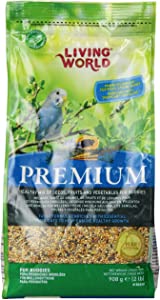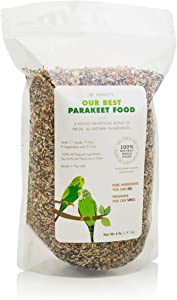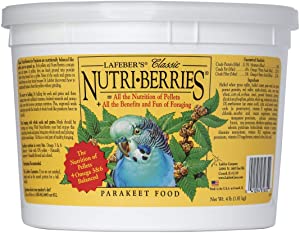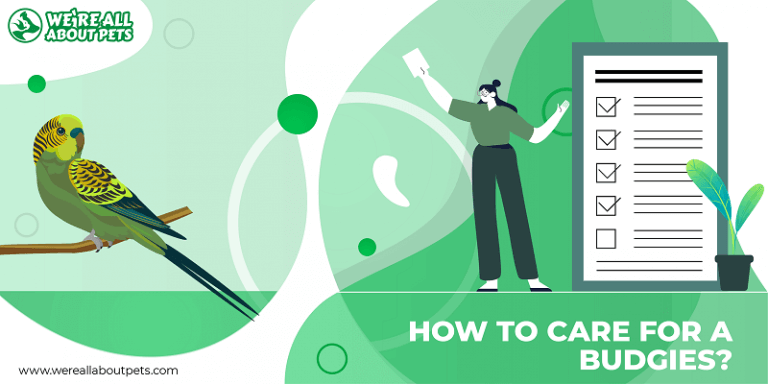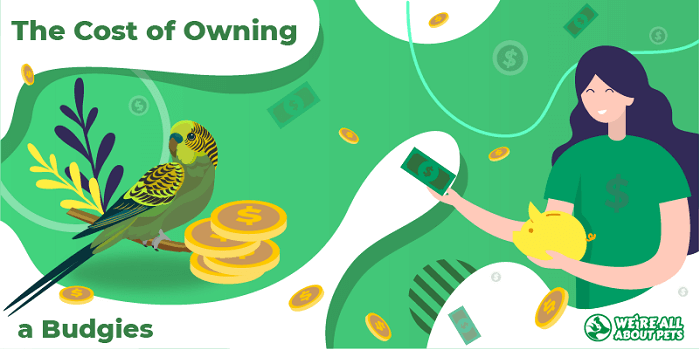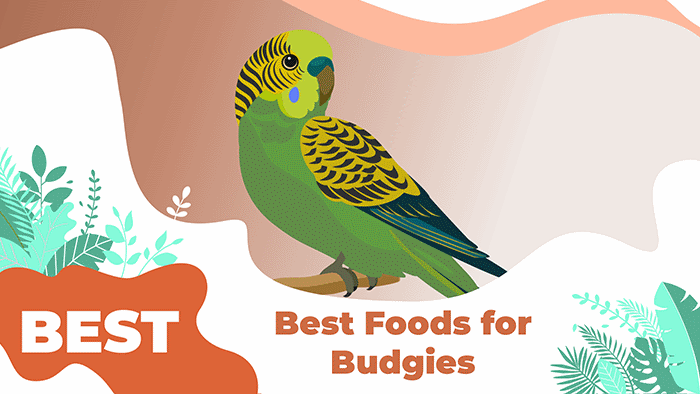What Do Budgies Eat?
This page contains affiliate links. We may earn money or products from the companies mentioned in this post through our independently chosen links, which earn us a commission. Learn More
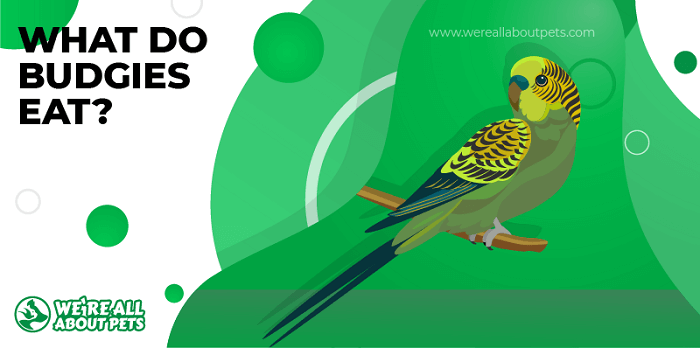
Budgies are small, playful birds also known as parakeets. These birds made wonderful pets because they are relatively easy to care for and have wonderful personalities.
As is true for any pet, budgies require a balanced diet for optimal health. Not only is it important to understand what your budgie needs in his diet, however, but you also need to know what foods are and aren’t safe for him to consume.
With proper care and keeping your budgies can live for six years or more. What it all comes down to, however, is a healthy diet. Read on to learn more about what your budgie can and cannot eat.
Quick Navigation
Safe And Unsafe Foods For Budgies
Wondering what your budgie can and can’t eat? We’ve assembled a list of dozens of foods that are and aren’t safe for your budgie. Check them out below!

26 Foods That Are Safe For Budgies:
Seeds or pellets and fresh fruits and vegetables should make up your budgie’s daily diet. Avoid fruit pits and make sure any foods you feed your budgie are fresh.
- Seeds
- Seed mixes
- Pelleted bird food
- Cucumber
- Lettuce
- Beetroot
- Tomato
- Celery
- Green beans
- Carrots
- Pea pods
- Cauliflower
- Sweet corn
- Banana
- Strawberries
- Apples
- Grapes
- Oranges
- Peaches
- Blueberries
- Pears
- Mango
- Melon
- Nectarines
- Cherries (no pit)
- Sweet potato (cooked)
20 Foods Budgies Can Eat In Moderation:
Depending what staple diet you choose, you may also want to offer whole grains or certain seeds as treats. Just be mindful of the fat content for certain seeds. Peas and beans are rich in protein but can be detrimental for budgies in large amounts, so feed sparingly.
- Amaranth
- Barley
- Buckwheat
- Canary seed
- Oats
- Quinoa
- Rye
- Sweetcorn kernels
- Wheat
- Herb seeds
- Sunflower seeds
- Flaxseeds
- Hempseeds
- Millet
- Pumpkin seeds
- Sesame seeds
- Chickpeas
- Black-eyed peas
- Green peas
- Lentils
13 Foods That Are Not Recommended For Budgies:
Avoid feeding your budgie human food, especially junk food, as well as large insects and insects that might bite. Avoid fruit pits and apple seeds as well.
- Human food
- Junk food
- Fried food
- Cockroaches
- Spiders
- Beetles
- Maggots
- Comfrey
- Peanuts
- Grit
- Dairy
- High-fat foods
- High-sugar foods
12 Foods Budgies Should Not Eat:
While some foods that aren’t’ recommended for budgies may not do any harm, there are certain foods that are toxic to birds. Avoid these foods entirely for your budgie’s safety.
- Avocado
- Onions
- Mushrooms
- Garlic
- Coffee
- Tea
- Alcohol
- Chocolate
- Fruit pits
- Apple seeds
- Nightshade plants
- Sugar-free candy
Understanding which foods are and are not safe for your budgie is very important, but a healthy start starts with understanding your budgie’s nutritional requirements. Read on to learn the specifics of what to feed your budgie in different life stages.
Types Of Budgie Diets
When it comes to feeding pet birds like budgies, you’ll need to decide whether you want to feed commercial pellets or not. This is a sensible choice for many pet birds simply because it offers balanced nutrition. Unfortunately, not all birds will eat pellets.
If you choose to feed your budgie seeds, they should make up no more than 60% of the diet. The rest should be fresh fruit and vegetables. When feeding budgies a seed-based diet, make sure the seeds are fresh by soaking them in water overnight. If fewer than 50% of the seeds sprout, they aren’t fresh.
In addition to your budgie’s staple diet, you should also provide a cuttlebone as a source of calcium. Not only do these provide nutrients for your budgie, but it can be a source of entertainment as well.
Here is a quick breakdown of the different components of a pet budgie’s diet:
- Seeds – Budgies will eat a variety of seeds but most of their seed diet should come from grass and grain seeds since they are a staple in the wild budgie’s diet.
- Grains – Small whole grains like amaranth, barley, quinoa, corn, and wheat can also be included in your budgie’s diet. Offer these as treats if you’re feeding a pellet-based diet.
- Commercial Pellets – If you choose to feed your budgie a pellet diet, it should make up 75% of his diet with the rest from fresh fruits and vegetables.
- Fruits and Vegetables – Whether you feed your budgie seeds or pellets, fresh fruits and veggies should also be offered daily. Offer small amounts of fresh food from the list above.
Now that you know what kinds of foods will make up your pet budgie’s daily diet, you’re probably wondering how much to feed. Keep reading to learn about feeding recommendations for budgies.
Meeting Your Pet Budgie’s Nutritional Needs
When it comes to meeting your budgie’s nutritional needs, balance is key. Though seeds make up the majority of a wild budgie’s diet, your pet budgie shouldn’t be fed seed mix alone.
Budgies require a balance of protein, healthy fats, carbohydrates, and essential vitamins and minerals like any other animal. If you feed your budgie seed mix, make sure it includes several different types of seed. You should also offer pelleted food formulated for budgies to ensure balanced nutrition.
Some birds don’t immediately take to pelleted diets, so you might need to spend some time converting your budgie. Eventually, pellets should make up about 75% of his diet with fresh foods making up most of the rest of the diet. Seeds can be offered as treats.
To give you an idea what do guinea pigs eat and much you should be feeding your pet budgie in different stages of life, refer to this chart:
| Age | Seeds/Grains | Pellets | Veggies and Fruits |
| Baby | 1 teaspoon millet
+ 1 tablespoon cooked brown rice |
1 tablespoon crushed pellets OR milled, mixed seeds | 2 tablespoons mixed and chopped fruits/veggies |
| Adult | 40% to 60% of the total daily diet
OR
75% commercially balanced pellets |
40% to 60% of the total daily diet
OR
75% commercially balanced pellets |
A few slices or pieces equivalent to 1-2 teaspoons |
In addition to providing for your budgie’s nutritional needs, make sure to have fresh water available at all times as well. Most birds prefer to drink from a dish, but they tend to get them dirty pretty quickly. Plan to clean and refill the dish at least once a day.
Recommended Commercial Budgie Foods
If you’re wondering how to make sure your budgie’s nutritional needs are met, a commercial food may be a good option to consider. These foods are formulated with your budgie’s specific needs in mind, though it’s still your job as a responsible pet owner to make sure you pick a high-quality product.
Here are some of our top picks for the best commercial budgie food:
Living World Premium Parakeet/Budgie Mix
Guaranteed Analysis
- Protein: 12% Min
- Fat: 9% Min
- Fiber: 8% Max
- Moisture: 12% Max
This budgie food features a nutritious blend of seeds, fruits, and vegetables enriched with essential nutrients. The seeds are air-cleaned and polished to reduce dust and the formula designed for nutritional balance.
Here are the ingredients:
Canary grass seed, white millet, red millet, oat groats, Siberian millet, canola seed, flaxseed, hemp seed, ground corn, dried papaya, niger seed, dried carrot, soybean meal, ground wheat, corn gluten meal, ground rice, ground dehulled sunflower seed, ground dehulled peanuts, dicalcium phosphate, orange oil (preserved with mixed tocopherols and citric acid), lecithin, calcium carbonate, yeast culture, ground flaxseed, dried beet pulp, dried kelp, L-lysine, yeast extract, DL-methionine, salt, choline chloride, beta carotene, zinc oxide, sodium selenite, vitamin E supplement, vitamin B12 supplement, copper sulfate, manganous oxide, folic acid, niacin, d-calcium pantothenate, vitamin A supplement, riboflavin, pyridoxine hydrochloride, thiamine mononitrate, biotin, calcium L-ascorbyl-2-monophosphate, calcium iodate, vitamin D3 supplement. Guarenteed Analysis: Crude Protein 12.0% (min), Crude Fat 9.0% (min), Crude Fibre 8.0% (max), Moisture 12.0% (max), Calcium 0.05% (min), Calcium 0.2% (max), Phosphorous 0.4% (min), Vitamin A 3,500 IU/lb (min), Vitamin D3 20 IU/lb (min), Vitamin E 5 IU/lb (min).
Harvey’s Our Best Parakeet Food
Guaranteed Analysis
- Protein: 15% Min
- Fat: 13% Min
- Fiber: 7% Max
- Moisture: 8% Max
This formula is uniquely designed to support optimal health and longevity as well as vibrant plumage. It consists of a rich blend of seeds, nuts, fruits, and vegetables to provide a balance of healthy nutrients.
Here are the ingredients:
White Millet, Canola Seed, Niger Seed, Canary Grass Seed, Oat Groats, Red Millet, Apple, Coconut, Carrot, Mango Dices, Hemp Seed, Sesame Seed, Flaxseed, Anise Seed, Poppy Seed, Caraway Seed, Banana, Orange Peel, Macadamia Nuts, Brazil Nuts, Filbert, Cashews, Almonds, Pine Nuts, Pecans, Walnuts, Pistachios, Soybeans, Broccoli, Zucchini, Green Beans, Green Bell Peppers, Red Bell Peppers, Freeze-Dried Peas, Spinach, Celery, Parsley
Lafeber’s Classic Nutri-Berries Pet Bird Food
Guaranteed Analysis
- Protein: 12.5% Min
- Fat: 6% Min
- Fiber: 5% Max
- Moisture: 14% Max
An excellent choice for foraging birds like budgies, these nutri-berries are nutritionally balanced and full of flavor. Your budgie will get the nutrients he needs and enjoy picking the berries apart to eat them.
Here are the ingredients:
Hulled white proso millet, hulled canary grass seed, red millet, malto-dextrin, oat groats, ground corn, peanuts, corn syrup, corn oil
Looking for more recommendations on what to feed your budgie? Check out our in-depth guide to the best commercial budgie foods.
Budgie Feeding FAQs
What do budgies eat in the wild?
In the wild, budgerigars or budgies feed primarily on the seeds of grass and grains. In addition to seed, however, budgies will also eat fruits, berries, and other vegetation.
How much do budgies eat?
Budgies are fairly small birds, so they may only require a few teaspoons of seed or pellets per day. Refer to the feeding guidelines on the package according to your budgie’s age and size.
What do budgies drink?
Budgies drink water and they should have fresh water available at all times. Make sure to clean and refill your budgie’s water dish at least once a day.
Do budgies eat insects?
Wild budgies are technically omnivores, so they are able to digest plants as well as insects. Seeds make up the majority of a budgie’s diet in the wild, but these birds may eat insects as well. If you feed your budgie insects, make sure they are small – avoid beetles, cockroaches, and spiders.






